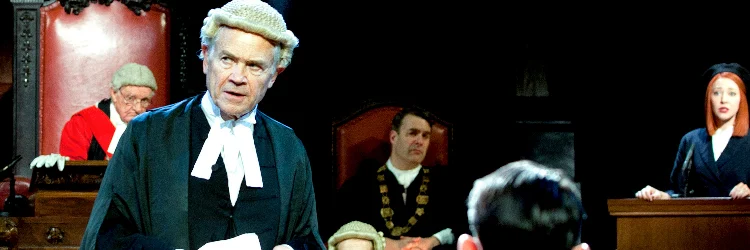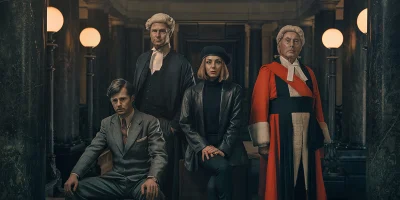
Review - Agatha Christie's Witness for the Prosecution at London County Hall
When Witness for the Prosecution premiered in 1953, it was one of Agatha Christie's proudest moments. Originally a short story, she had been convinced to turn it into a play set in a courtroom - an element that only played a small part in her initial story. This new production of her play focuses on that courtroom element, transforming London County Hall into the historic Old Bailey.
And it steps up to the job. The set truly immerses you in the setting, with the bench and witness box at one end with the audience sat in a horseshoe in the public gallery, with some sat in the jury's seats. There is a stage in the middle, which switches between being the court's chambers, and the floor of the courtroom on which the lawyers are vying to either defend their client, or get him sent down.
The case in question is that of Leonard Vole, in the dock accused of killing an older woman whom he became close to, just days after she changed her will. It would ruin the spirit of a murder mystery to give too much away, but rest assured one particular witness for the prosecution stands out at the centre of the case.
It certainly is an authentic experience. Christie's dialogue between the lawyers and the judge is excellent, managing to find humour without undermining their authority at any point. The two lawyers Sir Wilfrid Robarts for the defence and Mr Myers for the prosecution are portrayed excellently by David Yelland and Philip Franks, who could easily pass for the real thing in the Old Bailey.
One of the things this play fails to do that Christie's other wonderful stories manage is take you on a journey. There's no uncovering evidence and stumbling on surprise witnesses. Instead, you hear one side of the case, then another, and it just repeats itself with the odd revelation here or there before spurting out an action-filled finale. It feels less delicate than her other stories.
It is a nice theatrical experience. William Dudley's design is faultless, though this grandiose setting does it many a favour. Lucy Bailey's direction also aids the realistic vibe, with some subtle tinkering with the lights and sound to remind you that you are watching a play.
There's a great performance by Catherine Steadman, the feisty wife of the accused, Romaine. It's perhaps a shame that in one of the play's most central roles, Jack McMullen is not quite as convincing as Leonard.
It's a story that does manage to engage for the most part, but needs a few more gear changes. At times it's hard to see where the story is going, but it doesn't get you guessing. The audience isn't given enough to go on, and so there isn't an air of mystery to this murder. It's more a case of simply waiting for the verdict.
Click here to read our interview with Catherine Steadman.
Witness for the Prosecution is at London County Hall until 11th March.
Witness for the Prosecution Tickets are available now.
What the press said...
"Convention says that TV has now appropriated this kind of Christie mystery but, when staged as cleverly as this, her plays can still work with a live audience." - Michael Billington, The Guardian (four stars)
"There's a sense of occasion from the moment you enter this imposing space, where a jury of audience members is dwarfed by giant pillars." - Henry Hitchings, Evening Standard (three stars)
"Though I imagine some would wish me hanged for crimes of incorrect language, I'd suggest that the old girl has dunnit again. " - Dominic Cavendish, The Telegraph (four stars)
Links
The Guardian
Evening Standard
The Telegraph
The Stage
The Times
Frequently asked questions
What is Witness for the Prosecution about?
You’ve been summoned for jury service! Experience an Agatha Christie classic in a unique, historic courtroom setting. A widower is on trial, but only you can decide if he faces the noose in this enthralling production. Cast your judgment at Witness for the Prosecution at London County Hall today.
How long is Witness for the Prosecution?
The running time of Witness for the Prosecution is 2hr 20min. Incl. 1 interval.
Where is Witness for the Prosecution playing?
Witness for the Prosecution is playing at London County Hall. The theatre is located at Belvedere Road, London, SE1 7PB.
How much do tickets cost for Witness for the Prosecution?
Tickets for Witness for the Prosecution start at £21.
What's the age requirement for Witness for the Prosecution?
The recommended age for Witness for the Prosecution is Ages 10+. Parental guidance advised. Babes in arms are not permitted..
How do you book tickets for Witness for the Prosecution?
Book tickets for Witness for the Prosecution on London Theatre.
Originally published on


